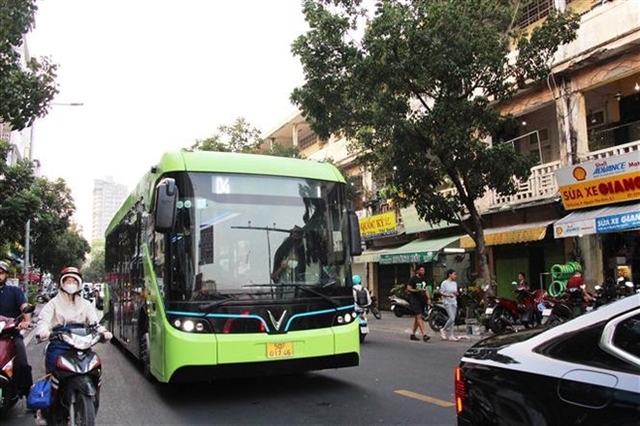 Society
Society

 |
| An electric bus in HCM City. The city aims to switch all buses to clean energy by 2030. — VNA/VNS Photo |
HCM CITY — HCM City will launch 443 new electric buses across 27 routes starting Friday (August 1), bringing the total number of electric buses in operation to 613, or more than 26 per cent of the city’s public transport fleet.
Fully subsidised by the city, the new 30-60 seat buses come equipped with free Wi-Fi, automated announcements, surveillance cameras, and cashless payment systems.
Free fares will be provided to children under 1.3m in height, people with disabilities, war veterans, wounded soldiers, and senior citizens with proper documentation.
A network of charging stations has been set up to ensure uninterrupted service, according to Nguyễn Vĩnh Toàn, deputy director of the Department of Construction.
The expansion is a major step in the city’s efforts to improve public transport quality and reduce emissions, Toàn added.
Following its administrative merger with former Bình Dương and Bà Rịa-Vũng Tàu provinces, HCM City now operates 164 bus routes with over 2,340 vehicles, including 21 electric routes introduced since last year.
The combined total of 613 electric buses and nearly 500 compressed natural gas (CNG) buses means eco-friendly vehicles now make up nearly 48 per cent of the city’s public bus fleet.
“This marks a major step in the city’s gradual transition to green energy in public transport,” Toàn said.
Broader national strategy, infrastructure challenges
The expansion aligns with Việt Nam’s national strategy to transition away from fossil fuel vehicles. Under the current government roadmap, all public buses nationwide are expected to run on clean energy by 2030.
HCM City is also developing a broader emissions control plan that includes financial incentives for individuals and businesses to switch from gasoline-powered vehicles to electric vehicles (EVs).
The proposal envisions buy-back schemes for old vehicles and subsidies for new EV purchases, applicable to private cars, taxis, and ride-hailing fleets.
The second phase of the plan, currently under review, will incorporate incentive policies and infrastructure development tailored to the city’s enlarged jurisdiction.
Despite the policy momentum, experts have warned of significant challenges.
These include an insufficient charging infrastructure, battery safety risks, and pressure on the national electricity grid, which often faces shortages during the dry season.
Other concerns include the risk of EV battery fires, lack of emergency protocols, and the absence of a recycling system for expired EV batteries, experts warned.
As Việt Nam remains heavily dependent on coal for power generation, the environmental benefits of EVs could be undermined without broader energy reform.
The success of the EV transition depends not only on increasing vehicle numbers but also on the country’s capacity to develop reliable infrastructure, ensure safety compliance, and sustain energy supply in the long term, they noted. — VNS




